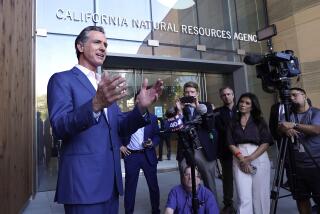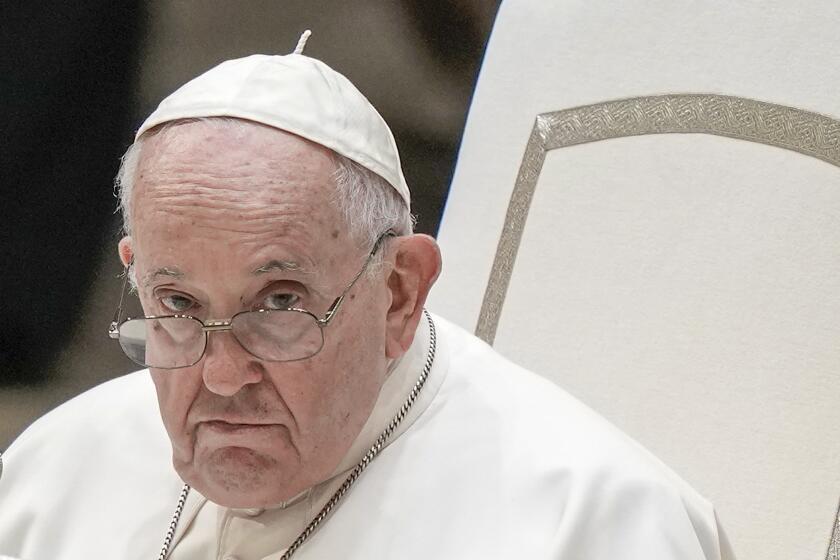Talk of Special OPEC Meeting Spurs Oil Prices : Session May Be Sought to Put Lid on Production
- Share via
BRUSSELS — World oil prices ticked upward Wednesday amid reports that three OPEC members might request an emergency meeting of the cartel to consider ways of cutting production and propping up prices.
But analysts remained steadfast in their predictions that the fractured cartel could do little to forestall continued price erosion through the summer.
“They just seem to have thrown in the towel,” said Paul McDonald, a London-based oil consultant and an expert on the Organization of Petroleum Exporting Countries.
Prices have dropped sharply over the past month in response to surplus supplies and a perception among traders that OPEC is crumbling.
The next regular OPEC meeting is set for Nov. 21, although that does not preclude a special session earlier if enough members deem it necessary.
The Kuwait News Agency, citing high-level senior industry sources, reported Tuesday that officials from Venezuela, Algeria and Ecuador were considering a call for such a meeting. But the agency said the three nations had not officially contacted other OPEC members.
The report also noted that major member states, such as Kuwait and Saudi Arabia, might object to an emergency session because there is no guarantee it would have any positive effect on prices and might even exacerbate the chaos now plaguing the cartel.
The Kuwaiti reports, coupled with the uncertainty caused by the U.S. destruction of an Iranian jetliner over the Persian Gulf, appear to have provided some temporary support for prices. The price of Brent crude from the North Sea was quoted in London in late afternoon at $14.65 a barrel, up 15 cents from Tuesday’s close. A month ago Brent, Europe’s most widely trade grade of oil, was going for $16.25 a barrel.
Refined Products Gain
On the New York Mercantile Exchange, West Texas Intermediate crude rose 27 cents Wednesday to $15.36 per 42-gallon barrel, after a 15-cent jump the previous day.
Among refined products traded on the exchange, unleaded gasoline closed up 0.84 cent to 50.56 cents a gallon and home heating oil advanced 1.02 cents to 42.61 cents a gallon.
Analysts nevertheless contend that crude oil prices are likely to fall from the existing range of $15 to $12 or even lower by the end of the summer.
Each $1 drop in the price of crude oil theoretically means a fall of 2.5 cents a gallon in retail gasoline prices, although oil companies usually do not pass on to consumers the full price decline.
The most common OPEC response to a sharp decline in oil prices is to cut production, or at least give the impression of tightening its output controls. Indeed, a report from the Paris-based International Energy Agency showed Wednesday that OPEC output fell slightly in June to 18.4 million barrels a day from 18.7 million in May.
Yet analysts say the cartel appears helpless to cut decisively, because Saudi Arabia and its Arab allies are unwilling, at least for now, to contemplate any cuts in production.
“We’re still a very long way from OPEC doing what is necessary” to avert a further price decline, said Fergus MacLeod, an oil analyst at the investment firm Barclays de Zoete Wedd in London.
Left System Unchanged
OPEC also is hurt by the continuing Iran-Iraq war, which has effectively allowed Iraq to ignore OPEC rules and pump more oil than any member except the Saudis.
At its last meeting in June, OPEC oil ministers failed to settle their internal problems and simply left the existing system of production quotas and prices unchanged, hoping oil demand would rise this summer.
Nothing has happened since then to improve chances of OPEC agreeing on production cuts or other measures to stabilize the market.
OPEC’s official oil price is $18 a barrel. But discipline in the 13-nation cartel is so poor that most, if not all, members are offering discounts to keep up their sales in a glutted market.
Worse, from OPEC’s point of view, is a growing reluctance of some members to adhere to OPEC-decreed production quotas. The United Arab Emirates, for example, has unilaterally declared that it will pump up to 1.5 million barrels a day instead of the 948,000 barrels it is allowed under the cartel agreement reaffirmed at last month’s meeting.
More to Read
Sign up for Essential California
The most important California stories and recommendations in your inbox every morning.
You may occasionally receive promotional content from the Los Angeles Times.










